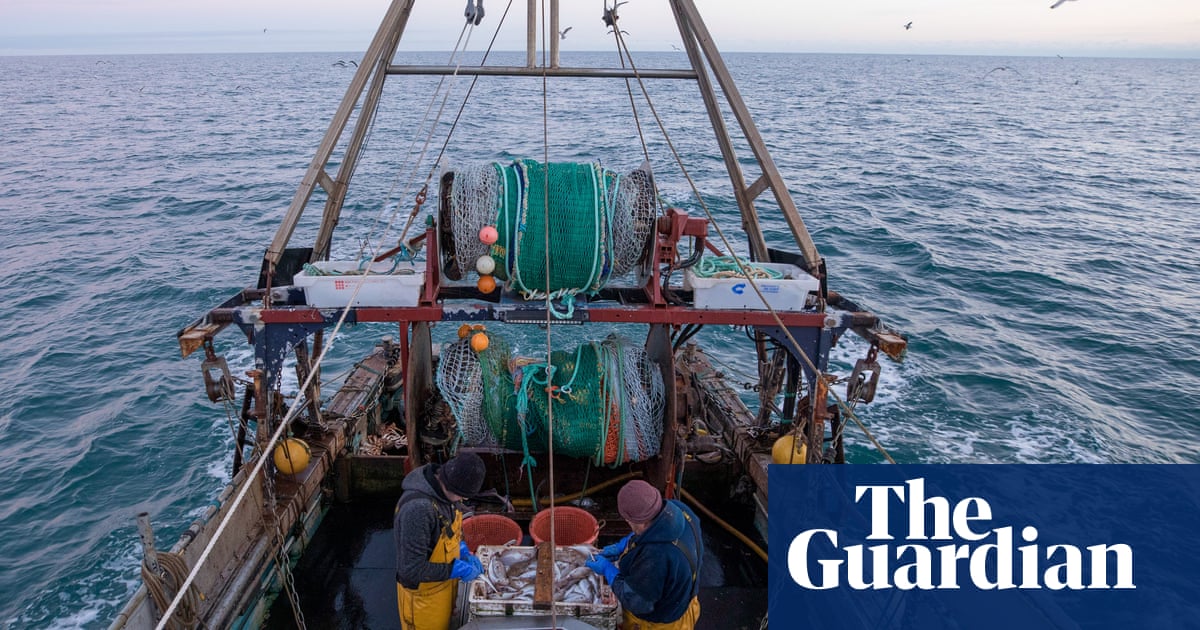Negotiations on a major reset of the UK’s relationship with the European Union have gone “down to the wire”, with fisheries and youth mobility among outstanding sticking points with hours to go before the start of a crucial summit.
In scenes reminiscent of the Brexit talks, British officials were still trying to reach a compromise with their EU counterparts overnight, as Keir Starmer prepared to host the European Commission president, Ursula von der Leyen, in London on Monday.
EU ambassadors, who were called to an unusual Sunday meeting in Brussels to discuss the summit, were told to be on standby for a further meeting in the evening or early on Monday as the deal was not yet over the line.
A UK government source said: “Negotiations are going down to the wire and a deal is not yet done. There are some outstanding issues on both sides and conversations will continue overnight.”
No 10’s decision to issue a press statement on Saturday presenting the summit as a done deal caused irritation in Brussels, prompting some to recall the mantra of Brexit negotiations: “Nothing is agreed until everything is agreed.”
One EU diplomat said: “The whole discussion is a package, we will not accept elements that are only at the advantage [or] request of the UK without strong guarantees and commitments on other issues of importance for the EU, such as fisheries, energy, youth mobility.”
Nick Thomas-Symonds, the UK minister in charge of negotiations, said on Sunday that talks were in their “final hours”, but admitted key details of the deal were still being worked out.
However, a flagship security and defence partnership means the UK will get access to a £125bn EU defence fund to rearm the continent, underlining the closeness of the security relationship with the bloc over the Ukraine conflict, in what could be a boost for British defence companies.
Downing Street hopes the summit with von der Leyen and other Brussels chiefs will draw a line under the turbulent Brexit years and show that the UK has fundamentally changed. They believe the deal would be regarded as a “step towards” a deeper partnership with Europe.
Ministers are ready for a big political offensive to explain the benefits of closer ties with the EU, amid some anxiety within Labour over how Reform UK will respond.
Both Nigel Farage and Kemi Badenoch, the Conservative leader, have already described the deal as a “surrender”, despite not yet knowing the details, and have indicated they would tear it up if they came to power.
Starmer is also facing pressure from within Labour, and from the progressive parties, to go further. Ed Davey, the Liberal Democrat leader, urged the prime minister to be “bold and ambitious for our country” and ignore “dinosaurs fighting old battles”.
Public attitudes towards Brexit have shifted significantly. Polls now suggest two-thirds of Britons back a closer relationship with the EU, and just 20% are opposed.
Fishing remains a stumbling block to getting the deal over the line. The EU insists that the UK government offer long-term access to British waters, beyond the four-year deal proposed by the Starmer government, and instead is pushing for a double-digit extension.
Brussels has linked fishing with an agreement to drop checks and bureaucracy around the sale of food, animal and other agricultural products, known as sanitary and phytosanitary goods. The EU has suggested this should be pegged to the same timescale as fish.
after newsletter promotion
The two sides were also understood to be discussing the language on a youth mobility deal allowing 18- to 30-year-olds to travel more easily between Britain and the bloc, amid EU concern about quotas on numbers.
UK ministers have talked about a “smart and controlled” scheme, suggesting it would have a cap and be time-limited, operating along the lines of the 13 existing deals Britain has with countries including Australia and Canada. The Conservatives have suggested it would involve a return to free movement “by the back door”.
Other issues understood to remain on the table on Sunday night were tuition fees, with Brussels pushing for EU students in Britain to pay the domestic rate rather than the much higher international rate, as well as the fee levied on EU nationals for using the NHS.
However, British holidaymakers are expected to face shorter airport queues this summer. Negotiators are on the verge of striking an agreement for UK passport holders to use e-gates across Europe, rather than waiting in queues to have their passports stamped.
There are plans to merge British and European emissions trading schemes, which the government says will reduce household bills and open up electricity trading with the continent.
Starmer faces a political battle with Reform UK and the Tories over his deal. Badenoch has promised to tear up any agreement Starmer that crosses strict Brexiter red lines should she make it into office. Her pledge is unhelpful to Labour’s attempts to convince Brussels that the UK is now a reliable negotiating partner.
The Lib Dems, meanwhile, have urged the government to join a new UK-EU customs union to boost trade with the bloc and boost growth. “The prime minister must ignore the dinosaurs fighting old battles, who want to drag us back to the destructive Brexit wars of the past, and focus on getting the best deal possible for the UK,” Davey said.
The Scottish National party went further, arguing that there was not a deal available better than rejoining the EU, almost a decade after the UK voted to leave. Its Europe spokesperson, Stephen Gethins, added: “It is the biggest and the best growth strategy available and yet it is the only option the Labour party have turned their face against – all because they are running scared of Nigel Farage.”

